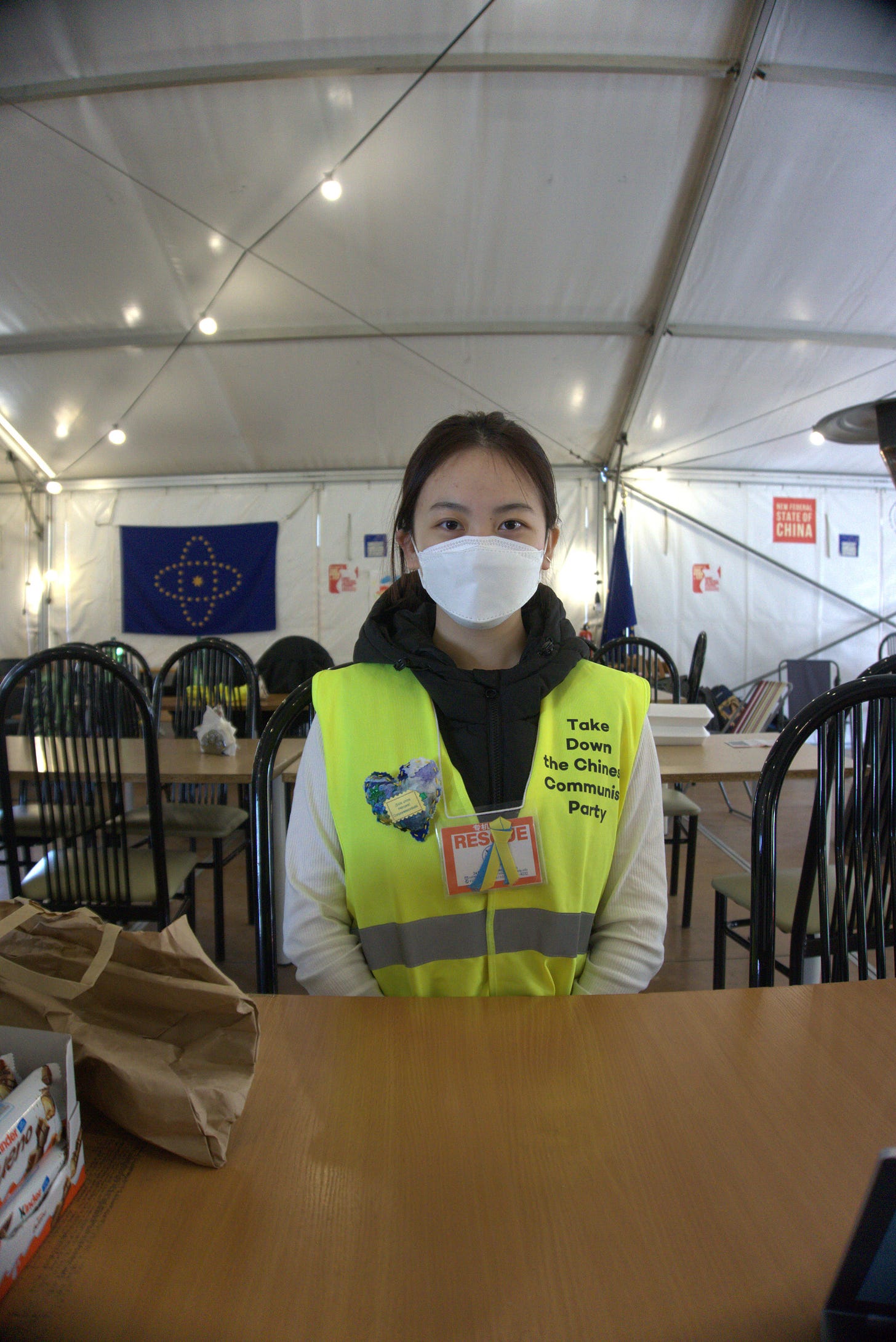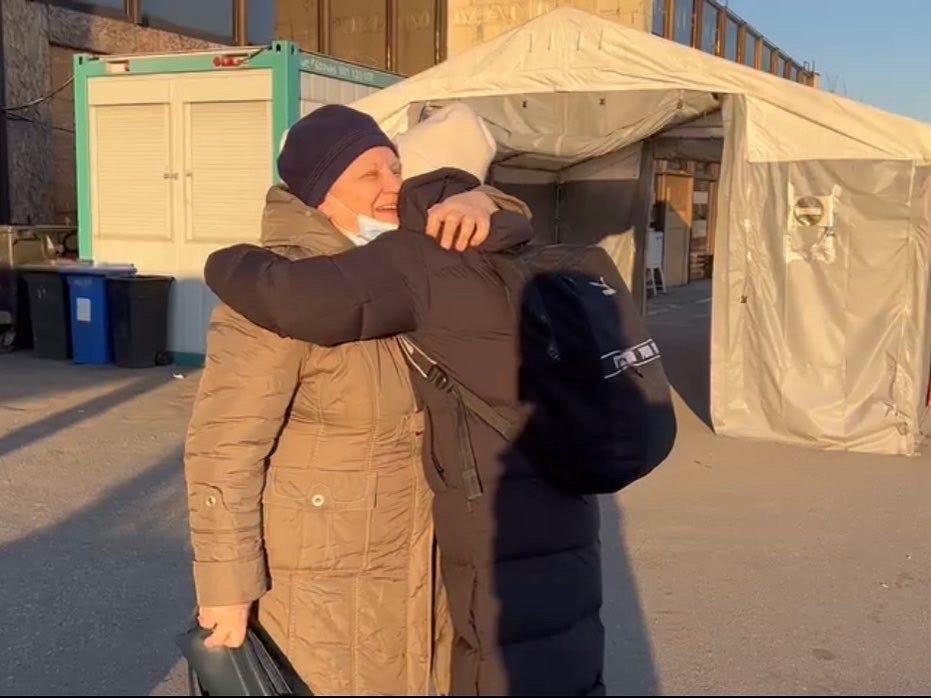Ukraine (I): An Interview With Feather, 19, a Volunteer from Ottawa
Feather is a student at the University of Toronto. We met in Medyka, a town on the Polish-Ukrainian border, where she had been assisting with the humanitarian rescue effort for three weeks.
FEATHER, 19, Ottawa
March 27, 2022
Medyka, Poland
How long have you been in Medyka, and Poland more generally?
“I’ve been in Poland for three weeks now, and this is actually my fourth time in Medyka. I was in Krakow the whole time, because our organization has this bus…we used to send this bus to Lviv every day to help people evacuate. I was in the call center…we have posters set up everywhere so they can contact us. And I picked up phone calls and gave people the help they needed, and the information to get to the bus. And that was in Krakow the whole time. But due to the drastic situation ongoing in Lviv right now, our bus got cancelled…we don't know what's going on there, but the bus is cancelled right now. So I'm here in Medyka to help people that need our help.”
Do you speak Ukrainian?
“No, I speak Mandarin, French, and English."
How do you expect to contribute here (at the camp)? I suppose logistics, phone calls - anything else?
“One of the main reasons I came to Poland is because my best friend's family is in Ukraine, in Mariupol, which is besieged as we all know, by the Russian forces. They have lost contact with their family as of March 1st. I downloaded Viber that everyone uses in Ukraine and I added their contact info - last seen was March 1st. The last time they were active.”
I wish the best for them, oh my goodness.
“Also I'm here trying to get in touch with the family. Trying my best.”
Where is your best friend right now?
“Ottawa. But their parents are with them, but the rest of the family is in Ukraine.”
Did you come here on your own, or with family?
“I'm here with my organization, the Rule of Law Foundation.”
Are you also here with the New Federal State of China?
“Yes.”
How long do you expect to stay here?
“For another week or week and a half before I head back to Canada. Although I want to stay longer. Also, I met a lady who had helped her family get out of Ukraine. I gave her my friend's family's contact information and address - and she started sending out the address to volunteer groups in Mariupol to check on their house and see if everyone’s okay, but it's really hard to even contact them and try to find a way to go to their house and get the message back to us. I really tried to get in touch with their family, but it's very hard because they're in the eastern side of Ukraine, we're in the western.”
How do you hope this ends, and how do you expect the conflict to resolve with time?
“I just hope that the Ukrainians can win the war and all the people who had to get out, and leave everything behind and go to another country, that they can safely come back to their home. We had an old couple, they just went to the U.S. to find their son and he told me, when I asked him, what do you hope for in the future, he just said “I want to go back to Kyiv” because everything they have, their music, their books, their cat, their friends, their memories - everything is there, so they want to go back. So I want them, and everyone, to safely return to Ukraine and I want my friend's family to be safe and they can get in touch with my friend as soon as possible. We just hope - they're all out of internet right now. I've also heard that a long of people have died on the way, trying to get out of Mariupol. I hope they're not one of them.”
When did you start getting involved with the Rule of Law Foundation?
“Actually I've never worked with them, it's my parents. They were, like, constantly donating to this organization. And after I learned there was an opportunity to take part in this rescue mission, I just applied. Because I want to help my friend's family and the people here. So I just started working with them three weeks ago.”
So you didn't fly here on your own, you were with a group of people from Ottawa?
“No, we have people from the U.S., from Spain, as well as Canada, and Italy, the U.K., all over the world. All the Chinese all over the world.”
Okay, so it's the Chinese diaspora that formed this non-profit organization or whatever it is? I’ll have to do more research on it. Are they grouped together, by the way, the NFSC and the Rule of Law Foundation?
“Yes - we are NFSC, but the rescue mission is supported by the Rule of Law Foundation.”
Has it been hard here? Do you find that your day-to-day life is difficult or taxing emotionally?
“I can't say difficult for me, but it must be difficult for other people. What they've been through is challenging. All I can do is be here and be helpful as best as I can. Which I think is never enough, until the war is over. And there are many people [who will] need help after the war is over. Must be really challenging for them, for the families. Because, you know, the men between the ages of 18 and 60 cannot get out of Ukraine, so they have to be separated. The families are separating, that must be really hard. Some of my friend's family cannot get out because of their age, two of them. It's really hard to see…
I also helped an old lady. She was staying in a hotel in Krakow. We helped her to get in touch with her son because her phone was broken. She didn't speak any English or Polish, just Russian and Ukrainian. We had to help her get a flight, get a new phone to get in touch with her son. She also needed a PCR test, so we had to plan everything for her. She's old so she had a lot of difficulties, she's like 75 years old.”
Where'd you meet her, in Krakow?
“In Krakow, yeah, she was from a bus. The bus brought her.”
That's a really touching story.
“I can show you her picture.”
Do you still talk to her? Do you have her contact?
“Her son is in Toronto. They’re in Toronto now.”
Oh, wow, she's in Toronto as well?
“Yeah, we helped her get to Toronto.”
That's incredible, wow. And her son?
“No, her son [was] in Toronto [from the start]. Her son is, like, the only way…her only family, you know.”
I see, I thought he was back in Ukraine. Do you know her name?
“Valentyna, with a y.”
And where did she come from, by the way, whereabouts in Ukraine?
“I'm not sure, but her bus came from the Lviv train station. She stayed in a hotel for like two weeks. She was waiting and waiting - very anxiously.”
This has been pretty comprehensive so far. Do you have any other stories - any other people you've met in particular? Or has it just been, like, helping out where you can and meeting people only very briefly?
“Yeah, that’s kind of what I do right now. Yeah, it's really rare to follow up with [refugees]...we’ll have one or two cases, but other than that we just help out with what we see here. Even with the phone calls as well, they're very short.”
(An excerpt from this interview was featured in the Toronto Star).




